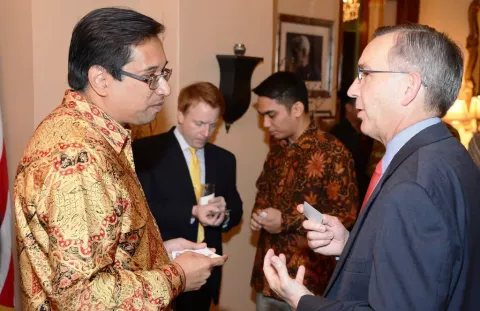What’s Indonesian Business Culture Like?
If you’re working with Indonesians or doing business in Indonesia, then learning about the business culture is essential.
Understanding the people, their values, etiquette and customs will greatly boost your success.
Indonesians are a friendly, welcoming people, however, they are also very particular when it comes to how people treat others.
That’s why is so important to demonstrate good manners and a positive disposition when interacting with Indonesian clients, colleagues and customers.
In this article, we’re going to share some insights into a few intricacies of Indonesian business culture, supported by practical examples.
5 Things About Indonesian Business Culture Foreign Professionals Need to Know
1. Speaking the Language Gains Face
Indonesians are proud of their shared language and when foreigners use it, no matter how little, it’s seen very positively.
Practical Example: Imagine you are visiting Indonesia to meet a potential new business contact. Dropping a few courtesies in Indonesian is going to make it clear you’ve done some homework and are keen to impress.
This gains face which is essential in demonstrating credibility.
2. Good Etiquette Establishes Trust
Etiquette, manners and customs are important in Indonesian culture, and this follows through into business practices where decorum and protocol are valued.
Practical Example: Picture a virtual meeting in which you meet some Indonesian counterparts for the first time. Spending time engaging in small talk both at the beginning and end demonstrates good manners and sincerity.
This shows you think inclusively which nurtures trust.

3. Respecting Hierarchies Creates Calm
Comparatively speaking, Indonesian business culture leans towards being hierarchical, meaning that at work people accept that there are clear power differences between ranks and positions.
Practical Example: Suppose you're in a meeting with an Indonesian client; it’s important to understand that within the Indonesian group, there will be a natural chain of command and that you can’t say or discuss topics which challenge the group’s hierarchy.
This puts people at ease because they feel safe.
4. Diplomat Communication Protects Relationships
Generally speaking, Indonesian communication is polite, high-context, indirect and very much focused on protecting people’s feelings.
Practical Example: You're working on a project with an Indonesian team. You notice they avoid eye contact during discussions and won’t disagree with any of your ideas suggesting that, in fact, they might have some negative feedback. So, you speak to individuals, separately, afterwards to get their ideas.
This displays the agility needed to protect relationships.
5. Patience Demonstrates Understanding
Things happen at a different pace in Indonesia, with locals referring to their attitude to time as ‘rubber, i.e. they are very flexible.
Practical Example: You turn up to a meeting on time but are left waiting a while before being invited in. Rather than express frustration that you’ve been kept waiting you explain that you had a great conversation with the receptionist about local restaurants.
This shows you are someone in control, with patience and understanding.
Summarising Indonesian Business Culture
To summarise, here are some key points you need to consider about Indonesian business culture if it’s new to you:
1. Learning to speak some of the language gains face.
2. Demonstrating good manners nurtures trust.
3. Respecting hierarchies creates a sense of security.
4. Communicating diplomatically protects personal relationships.
5. Exercising patience demonstrates wisdom.

Take a course in Indonesian Business Culture
Want more insights into doing business or working with Indonesians? Then take our eLearning Cultural Awareness Course on Indonesia.
It’s packed full of insights, information and tips for business professionals wanting to work more effectively with Indonesian culture.
By accepting you will be accessing a service provided by a third-party external to https://www.commisceo-global.com/

 +44 0330 027 0207 or +1 (818) 532-6908
+44 0330 027 0207 or +1 (818) 532-6908
